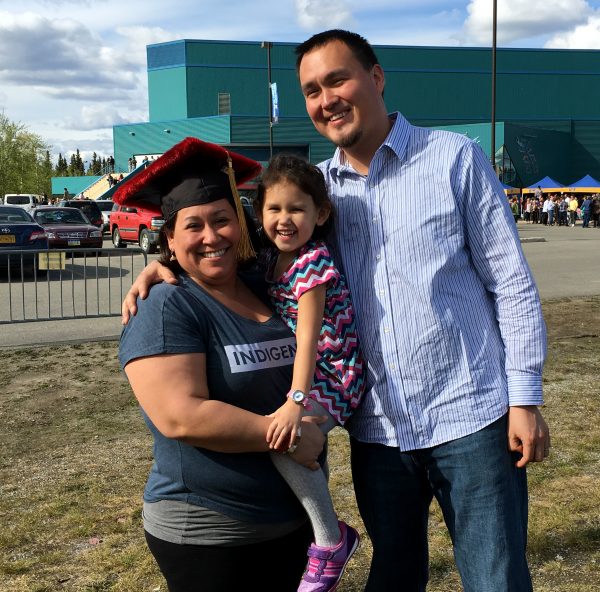UAF alumna leads tribal college with Western knowledge, indigenous wisdom
October 19, 2016
Leona Long
907-474-5086

Download story text and captions here.
Higher education has always been as important to Pearl Kiyawn Nageak Brower as her traditional Iñupiat way of life.
Brower’s grandmother was known throughout the region as a longtime member of the North Slope Borough School Board and advocate for educational opportunities. Her grandfather was a culture bearer who walked the entire North Slope, a region about the size of Oklahoma.
“It touches my heart when someone who knew her tells me that they see in me my aaka’s commitment to advocating for education,” said Brower, who grew up in a community of whalers and hunters in Barrow, and ranchers in Northern California.
“I want my daughter and her children to be able to say the same things about me,” added Brower, who earned her bachelor’s, master’s and doctorate degrees from the University of Alaska Fairbanks. “I want children growing up on the North Slope to know that they don’t have to choose between living their traditional lifestyle and a college degree. No matter what their dream is, I want them to know that it’s possible and attainable.”
As president of Barrow’s Iḷisaġvik College, Alaska’s only tribal college, the high school valedictorian continues her family’s tradition of championing education opportunities in rural Alaska.
“Working at Iḷisaġvik College has added to my passion for higher education and why a tribal college is important to Alaskans,” Brower said. “In today’s world, we need people with certificates and degrees in all facets of professions. Alaska’s community college graduates fill important jobs and help create sustainable rural communities.”
After graduating from Shasta College in Northern California, Brower returned to her roots in Alaska. She moved to Fairbanks, where she completed her bachelor’s degrees in anthropology and Alaska Native studies in 2004. In 2010, while working full time at home in Barrow, she used distance education to earn a master’s degree in Alaska Native and rural development. This May, Brower graduated with her doctorate degree in indigenous studies, with an emphasis in indigenous leadership.
As a student in the UAF College of Rural and Community Development’s Alaska Native studies and rural development programs, Brower experienced how incorporating indigenous values into education and student services helps students from all walks of life. She has worked to bring that same approach to Iḷisaġvik.
“Iḷisaġvik College is incredibly student focused,” Brower said. “We spend a huge portion of our budget and time on supporting our students. This gives us an opportunity to connect with each student and help them succeed. Although we are a tribal college, only a bit more than half of our students are Native American or Alaska Native. It’s Iḷisaġvik College’s commitment to students that attracts students from all different backgrounds here in the state and some from outside of Alaska as well.”
Nearly a decade ago, Brower was part of the Arctic Institute for Indigenous Leadership. UAF created the transformative, culturally based program to help develop young Alaska Native leaders statewide. Now, the College of Rural and Community Development and Iḷisaġvik College have formed a partnership to launch the Northern Alaska Indigenous Leadership Academy this coming spring.
Made possible by a $250,000 contribution from Exxon Mobil Corp., NAILA fosters wellness, leadership and community sustainability among Alaska Native leaders from the Interior and North Slope regions. Students will receive college credit from either UAF or Iḷisaġvik College. The initial 25 applicants will be part of a peer network connecting them with educational opportunities fostering personal and professional growth.
“What makes the Northern Alaska Indigenous Leadership Academy different is that the curriculum focuses on the whole person and the emphasis on healing and wellness,” Brower said. “This holistic approach incorporates indigenous wisdom and the Western educational system to develop indigenous leaders who will transcend boundaries and lead us into the future.”


